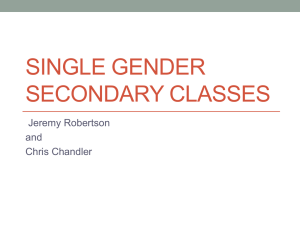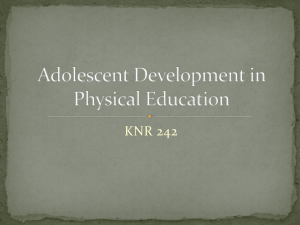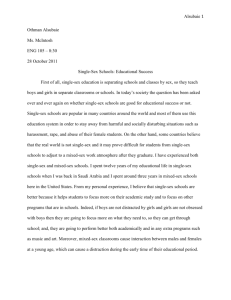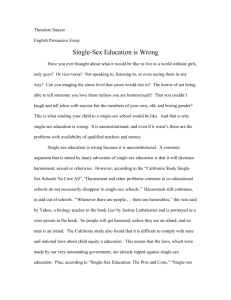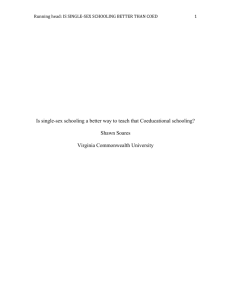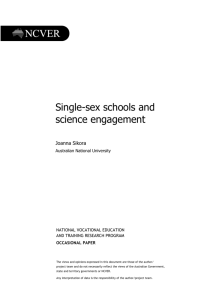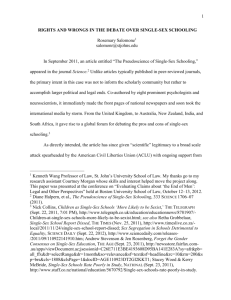A Choice Coed or Single Sex Schools
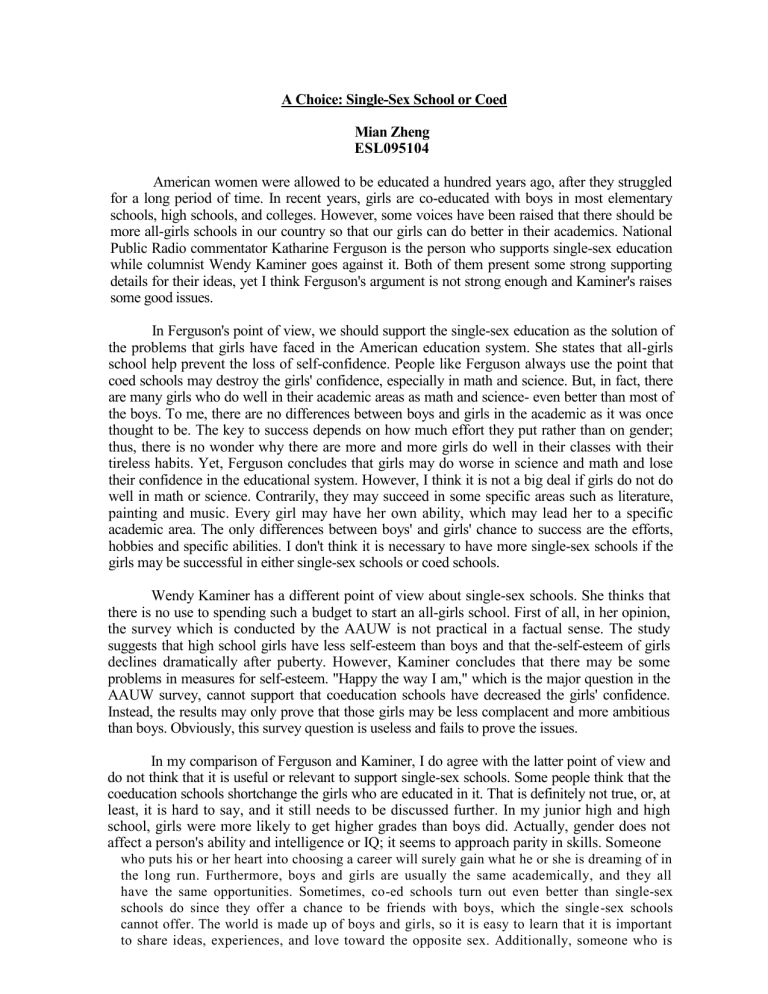
A Choice: Single-Sex School or Coed
Mian Zheng
ESL095104
American women were allowed to be educated a hundred years ago, after they struggled for a long period of time. In recent years, girls are co-educated with boys in most elementary schools, high schools, and colleges. However, some voices have been raised that there should be more all-girls schools in our country so that our girls can do better in their academics. National
Public Radio commentator Katharine Ferguson is the person who supports single-sex education while columnist Wendy Kaminer goes against it. Both of them present some strong supporting details for their ideas, yet I think Ferguson's argument is not strong enough and Kaminer's raises some good issues.
In Ferguson's point of view, we should support the single-sex education as the solution of the problems that girls have faced in the American education system. She states that all-girls school help prevent the loss of self-confidence. People like Ferguson always use the point that coed schools may destroy the girls' confidence, especially in math and science. But, in fact, there are many girls who do well in their academic areas as math and science- even better than most of the boys. To me, there are no differences between boys and girls in the academic as it was once thought to be. The key to success depends on how much effort they put rather than on gender; thus, there is no wonder why there are more and more girls do well in their classes with their tireless habits. Yet, Ferguson concludes that girls may do worse in science and math and lose their confidence in the educational system. However, I think it is not a big deal if girls do not do well in math or science. Contrarily, they may succeed in some specific areas such as literature, painting and music. Every girl may have her own ability, which may lead her to a specific academic area. The only differences between boys' and girls' chance to success are the efforts, hobbies and specific abilities. I don't think it is necessary to have more single-sex schools if the girls may be successful in either single-sex schools or coed schools.
Wendy Kaminer has a different point of view about single-sex schools. She thinks that there is no use to spending such a budget to start an all-girls school. First of all, in her opinion, the survey which is conducted by the AAUW is not practical in a factual sense. The study suggests that high school girls have less self-esteem than boys and that the-self-esteem of girls declines dramatically after puberty. However, Kaminer concludes that there may be some problems in measures for self-esteem. "Happy the way I am," which is the major question in the
AAUW survey, cannot support that coeducation schools have decreased the girls' confidence.
Instead, the results may only prove that those girls may be less complacent and more ambitious than boys. Obviously, this survey question is useless and fails to prove the issues.
In my comparison of Ferguson and Kaminer, I do agree with the latter point of view and do not think that it is useful or relevant to support single-sex schools. Some people think that the coeducation schools shortchange the girls who are educated in it. That is definitely not true, or, at least, it is hard to say, and it still needs to be discussed further. In my junior high and high school, girls were more likely to get higher grades than boys did. Actually, gender does not affect a person's ability and intelligence or IQ; it seems to approach parity in skills. Someone who puts his or her heart into choosing a career will surely gain what he or she is dreaming of in the long run. Furthermore, boys and girls are usually the same academically, and they all have the same opportunities. Sometimes, co-ed schools turn out even better than single-sex schools do since they offer a chance to be friends with boys, which the single -sex schools cannot offer. The world is made up of boys and girls, so it is easy to learn that it is important to share ideas, experiences, and love toward the opposite sex. Additionally, someone who is
educated in a single-sex school will find herself living outside the real world. One of the persons, who was educated in the all girls elementary school and finally got into a co -ed high school, once said, "Before, I thought that single sex schools were better, but it took me 6 months to realize that I was held closely in my own box and that I didn't see the real world outside of it. It offers the same things, but it is limited...It is not because of boys, it is because of the challenges and things that they teach you there...We can never escape the fact that we all live in a world where there are two different genders." I think that is really a common problem that single-sex schools may face. Absolutely, we cannot live without the opposite sex because we are living in a basic social organization that contains two genders. In the single sex schools, during all the school time, you can only meet with all boys or all girls only. It is simply not the real world, and students may find that there are many problems in communication and work after they graduate from the single-sex schools and step into the real world.
■
Generally speaking, I agree with Kaminer's idea that it is not necessary to use the budget to support the single-sex schools. The coed schools or the single-sex schools may have similar problems as any school. However, it would be better to increase the qu ality of the coed schools rather than to build up some new single-sex schools. I think Ferguson would ultimately agree with doing what is the best for both girls and boys.
